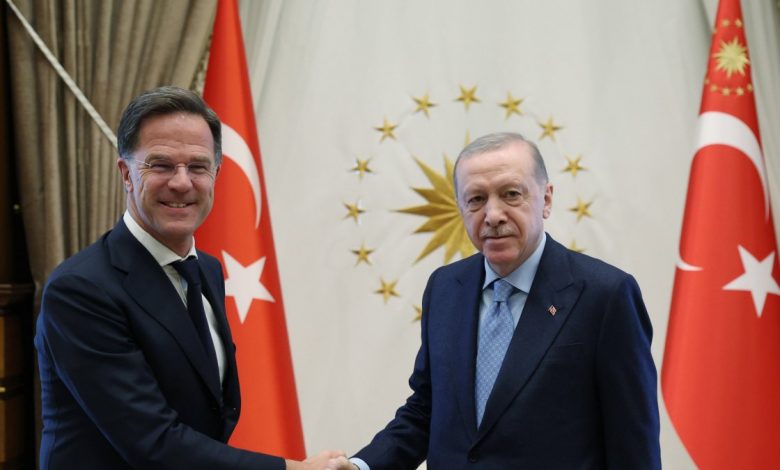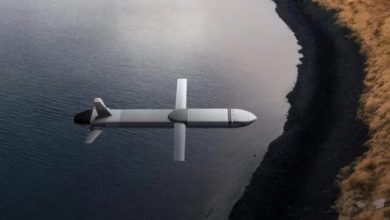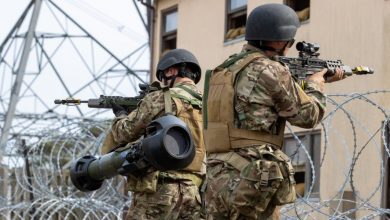Erdoğan meets NATO chief as bloc’s diplomats gather in Türkiye

NATO Secretary-General Mark Rutte met President Recep Tayyip Erdoğan in the capital, Ankara
Foreign Minister Hakan Fidan and the president’s chief foreign policy and security adviser, Akif Çağatay Kılıç, accompanied the NATO secretary-general and the president at the meeting at the Presidential Complex. The meeting precedes a two-day critical meeting of the alliance’s foreign ministers.
Ministers will gather in the southern province of Antalya for an informal meeting on Wednesday and Thursday. The summit’s last day coincides with a much-anticipated meeting between Ukrainian and Russian officials for another attempt at peace in Istanbul. The gathering in Antalya will also serve as a preparatory meeting for the upcoming leaders’ summit in The Hague.
The Presidency’s Directorate of Communications said in a statement that the Erdoğan-Rutte meeting focused on Türkiye’s relations with NATO, the Ukraine-Russia conflict, and regional and global issues. Erdoğan underlined that Türkiye attached importance to NATO, and its second assumption of command of NATO’s Kosovo Force (KFOR) indicated this. The directorate said Erdoğan also emphasized Türkiye’s expectation for cooperation from its NATO allies on counterterrorism while pledging his country’s commitment to keeping NATO strong despite internal and external challenges.
Erdoğan noted that Türkiye stepped up efforts for a permanent and fair peace to end the Ukraine-Russia conflict and held talks with Russian and Ukrainian leaders. Erdoğan stressed that Türkiye strongly supported a comprehensive cease-fire and preserved its view that NATO should not be a part of this conflict. He highlighted that the peace opportunity should not be squandered.
Representatives from all 32 NATO member states are expected to attend the meeting, which will provide a platform for additional consultations ahead of the June summit.
On Wednesday evening, the foreign ministers, Rutte and other senior officials, are scheduled to join a social event hosted by Fidan.
An informal session of the North Atlantic Council will take place on the morning of May 15, where the foreign ministers will exchange views on priority issues and potential decisions for the upcoming summit.
Efforts to revise burden-sharing within the alliance and shape the future of European security will be among the top issues.
Fidan is expected to stress the importance of reinforcing NATO’s unity and deterrent capacity, warning against any erosion of its founding role in Euro-Atlantic security.
He will also underscore Türkiye’s commitment to further increasing its defense investments and contributions to the alliance, highlighting that its defense spending already exceeds NATO’s 2% gross domestic product (GDP) target.
Fidan is likely to call for the removal of all barriers to defense industry cooperation and stress the need for genuine solidarity in counterterrorism efforts, while reiterating support for peace and stability in adjacent regions and the Middle East.
On the margins of the gathering, Fidan is also set to hold several bilateral meetings with his counterparts.
A member of NATO for over 70 years, Türkiye plays a central role in the alliance’s defense posture.
The NATO Land Command (LANDCOM) is based in Türkiye and the country hosts the NATO Rapid Deployable Corps Headquarters in Istanbul.
Türkiye also ranks among the top contributors to NATO’s command and force structure and consistently provides sustainable support to its missions and operations.
Rutte wants member countries to agree at the summit in June to reach 5% of GDP on defense-related spending by 2032, Dutch premier Dick Schoof said last Friday.
U.S. President Donald Trump has demanded that NATO allies ramp up their military spending to 5% of GDP, a level that not even the U.S. currently hits.
Schoof said Rutte had written to NATO’s 32 member countries calling for them to reach 3.5% of GDP on “hard military spending” and 1.5% on “related spending such as infrastructure, cybersecurity and other things” over the next seven years.
Trump is piling the pressure on Europe and Canada to ratchet up NATO’s spending target at next month’s summit.
Rutte last Friday refused to confirm the figures being debated but said “internal discussions” were taking place within NATO.
Diplomats within NATO, speaking on condition of anonymity, said the proposal circulated last week envisioned increasing direct military spending by 0.2% each year to 2032.
They said the discussions were at an early stage, and there were no clear signs yet that there would be consensus for the figures.
The parameters of what could be included in the 1.5% of loosely related defense spending were still to be defined, they said.
“It makes no sense to argue about abstract GDP percentages now. What is crucial is that we continuously expand our efforts over the next few years,” Germany’s new chancellor, Friedrich Merz, said during a visit to NATO’s headquarters in Brussels last week.
Merz said that for Germany, every increase of 1% of GDP represented 45 billion euros ($50 billion).
Trump has long accused Washington’s allies of underspending on their defense and taking advantage of U.S. largesse. He has also threatened not to protect countries that do not spend enough on their military, in his eyes.
European countries have ramped up their defense spending since Russia’s invasion of Ukraine in 2022, but Rutte says they must go considerably higher to ward off Moscow.
Last year, 22 of NATO’s 32 allies hit their current spending target of 2% of GDP on their militaries.
A string of countries, such as Italy, Spain, Canada and Belgium, that still lag below that level have pledged to reach it in 2025.
The U.S. last year spent 3.19% of its GDP on defense, behind eastern flank countries Poland, Estonia and Lithuania, close to Russia.
But Washington remains by far the biggest military spender in NATO in absolute terms, accounting for 64% of all defense expenditure last year.
In a bid to help European countries bolster their spending, the EU has proposed loosening budget rules and establishing a 150 billion euro defense fund.





